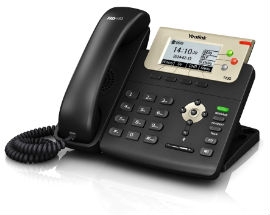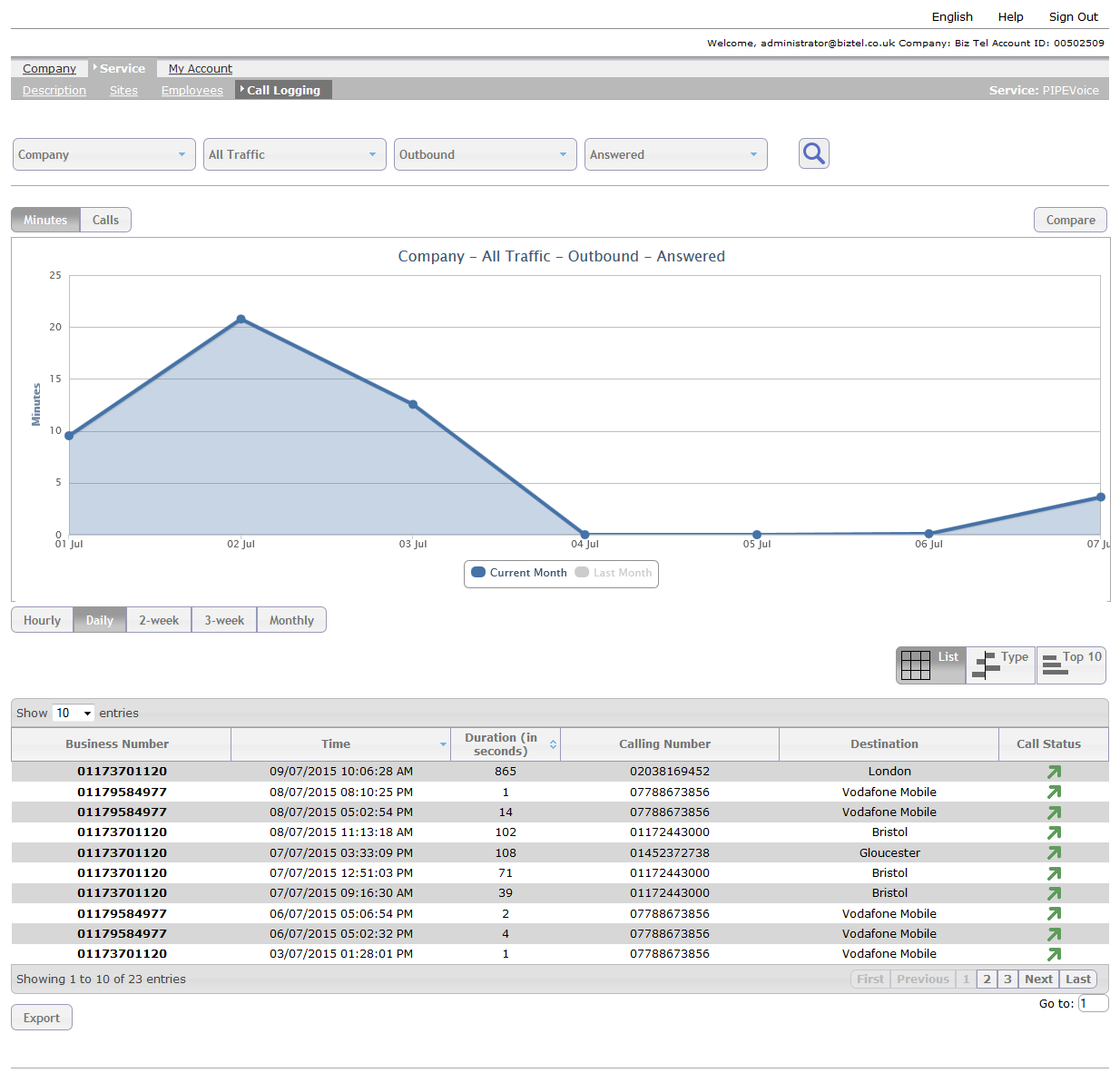I don’t know exactly what the future holds or what phones are going to look like in a few years time but I am pretty certain that in the near future more and more phone conversations are going to go over the internet. Desk phone systems, mobiles and soft phones are all using the internet more and more.
A Brief Background To Hosted Telephony
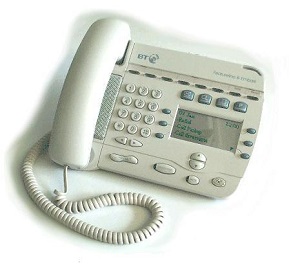
An Older Style Centrex Featureline Phone
Hosted telephony has been around for ages, since the 1960’s in fact. For many years it was run over ordinary phone lines and this type of system is known as Centrex. Some of you may have heard of BT’s Featureline version of it which is still being used today. Featureline or Centrex is a phone system housed centrally back at the exchange that you can access using special phones connected to it over ordinary telephone lines. Compared to today’s internet phone systems it’s a little clunky but it still works well enough.
Hosted telephony over the internet on the other hand has had a difficult birth but has grown up and works really well now. Some people call it a Cloud service which indeed it is. Its origins go back to the early 1970’s but it took until around 2004 before this type of telephony became a credible service. With the advent of faster and more reliable broadband in the last few years it’s now become a low cost and reliable service that is easily made available to domestic and business users alike.
I love Hosted Telephony
There were around 155 million subscribers to internet based telephony in 2013.
I have been involved with Hosted Telephony for around 10 years and I think it’s a brilliant service. I thought it was a fantastic concept the first time I was introduced to it. The trouble in the early days was that it didn’t work very well and the broadband available just wasn’t up to it. I have to say there were some very painful moments in the early days and VoIP (Voice over Internet Protocol) based telephony was pretty flaky. VoIP soon gathered a bad reputation amongst the early pioneers such that you would hear “oh yes, VoIP, the business down the road had that put in but it was rubbish and they had to take it back out again, I’m not touching it”.
I remember the unreliable early days of mobile telephony and my first analogue mobile phone. It’s often the same whenever any new service or product comes out, the early pioneers take the hits.
The Good News
Hosted Telephony over the internet has come of age.
The good news is that VoIP based Hosted Telephony is so much better now. Services are reliable, quality is high, systems are flexible and it’s simple to set up. So much so that most providers can send you pre-configured phones that you can plug into your network like any other device and they will just work out of the box. Some networks need a few adjustments but most don’t.
With emerging high definition audio the quality of calls is becoming much better than anything we have used before.
In some countries this type of telephony is set to be the dominant service in the near future. Take up in the UK is increasing with over 4 million subscribers in 2013 and it’s likely that this figure has exceeded 5 million by now. Much of the main BT trunking of UK calls is now over internet services so it doesn’t make a great deal of difference any more whether you use traditional telephone lines or not.
But I Still Don’t Quite Get It, What Actually Is Hosted Telephony Over The Internet?
To explain more clearly …
Up to the last few years most businesses would go out and buy a phone system which they would install in their premises and attach phone lines and phone extensions to. A business would then have to maintain the system or more likely pay a telecommunications company to do it. When they wanted to change something they often had to get an engineer to do it. Capital expenditure was relatively high and they would have to get a new system every so many years as technology moved on and as manufactures stop supporting older systems. This cycle would usually run over 5 to 10 years.
Most domestic users wouldn’t dream of owning a phone system. Instead they would usually have a phone line and phone that lets them access some of the services you get on a phone system such as voice mail or call redirection.
Hosted telephony is a phone system but one that is held in a computer server farm somewhere and maintained by the company that supplies the service to you. All you or your business needs to do is buy the appropriate phones with the service and that’s it. If a phone goes wrong you can just get another one, change a few settings and off you go, as if nothing happened. You can much more easily control the phone and your phone system account from a web browser or plug-in widget … from anywhere. It’s like many other apps we use these days. Maybe this sounds too simple but that’s how it is nowadays and it works!
Here Are 10 Reasons Why I Like It So Much!
1 – Low Capital Investment
Cost is a big bottom line for many. There’s very little equipment needed for IP based Hosted Telephony. You need the phones, a decent broadband supply and a switch, preferably a POE switch (one that can supply power to the phones).
Typically, at the time of writing:
- £100 – 8 Port POE switch or £300 – 24 port POE switch (Power Over Ethernet – supplies power and data to the phone)
- £80 – A budget display IP phone
So let’s say you wanted an 8 phone system, that would need just the 8 phones and an 8 port POE switch which will probably cost in the region of £740 including tax for the hardware. A traditional phone system might cost twice as much or even more once it’s all installed.
You can also use soft phones (use your computer to make calls) albeit they are not usually as good as a dedicated internet phone (IP phone).
Other Equipment
Just because I don’t want to miss these things out; you can use conference phones and business or domestic class wireless phones with Hosted Telephony too!
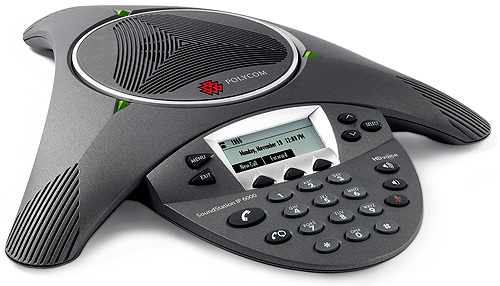 Polycom SoundStation IP6000 | 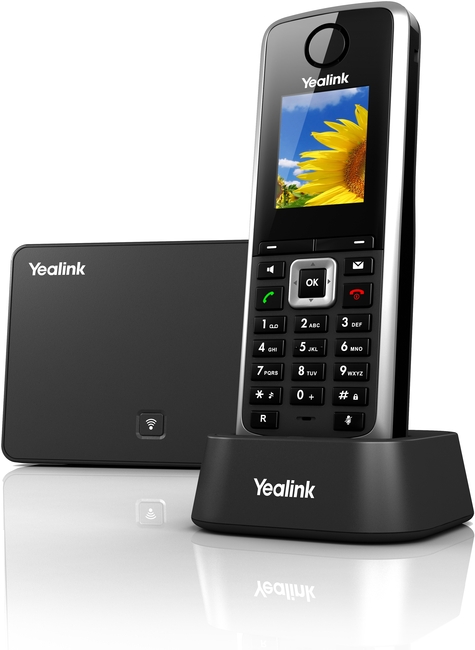 Yealink W52P |
Most suppliers will have a range of phones from one or more manufacturers that you can use depending on whether you want very simple phones all the way up to sophisticated colour display phones with touch screens.
2 – Scalable
This is one of the most flexible things about Hosted Telephony. Most Hosted Telephony systems are billed for monthly on a per subscriber basis so if you have 8 phone’s you pay 8 subscriptions. This is like having 8 traditional phone lines … in fact it’s like having more than 8 lines as you can put people on hold whilst you talk to another and hold 3 way conference calls so it’s more like having 16 phone lines available for when you need them.
Typically a subscription will cost between £6 and £10 depending on the provider and the features you want. For 8 phones you might be paying £56 a month. Here’s the but … with most providers you can change the number of subscriptions you have each month so if your business is 8 people this month, 12 people the next month and 6 the month after that you only have to pay for the number of subscriptions you use at those times. It’s true that you may need to buy the extra phones but at least you only need to pay for services as and when you need them.
In a similar way extra features like call recording and operator consoles can be added and taken away as needed.
3 – Mobility
For Hosted Telephony mobility can mean quite a few things …
If you are based in London, you have a 0208 number for example and you want to move to say Nottingham, no problem, just unplug the switch and the phones, take them to Nottingham, plug it all back in again and carry on. You will retain your 0208 number and in theory if your move was to Australia the same applies.
Got an office with some people working from home? Maybe you have an apartment in Spain? That’s no problem either, each can have their own phone or soft phone wherever they are and it’s still part of the same system. It’s worth mentioning that calls between phones on the same system are free, wherever they are.
Sometimes you are in the office, sometimes at home, sometimes at clients and sometimes in the car. Again no problem you can set Hosted Telephony to follow you by ringing each of your phones in turn until you answer or if you like all your phones can be rung at the same time.
Some systems might have a little app that goes on your mobile to make it part of the system. As an aside more mobile phones are becoming available that can make calls over the internet when available instead of the 2G mobile network.
Hosted telephony allows you to use numbers that are not in your area so if you are in London and want to have numbers for Bath and Brighton that’s no problem either. I don’t know if this is a good or bad thing but it does mean that area based numbers are losing their meaning, much as the mobile phone network by default means area numbers don’t make any sense.
4 – Easy to Maintain And Great Support
If you have your own on premises phone system you often end up paying for support. Support for when you don’t understand something, when you need something changed and for when something goes wrong.
With Hosted telephony much of that support comes with the subscription. The thing that you may need help with from your IT support is if there are problems on your network or broadband supply. Having said that Hosted Telephony support will overlap with your IT support and if your Hosted telephony supplier is supplying your broadband then this area is covered.
Support will be able to help you with how to do things yourself and will be able to do them for you if needed.
5 – A Uniform Experience Everywhere
Let’s say you have a business with one main office and 10 branches. If you went down the traditional PBX route and you had opened the branches at different times you might have a variety of phone systems or maybe no phone system if the branch is very small. These systems might not talk to each at all or maybe partially. The different phone systems may work in different ways.
With hosted Telephony none of this matters, the system works the same everywhere, everyone can communicate with everyone else and it doesn’t matter if there is 1 person or 100 people at any particular location.
6 – Backup and Fail-over
Because the main system is hosted in secure duplicated environments everything is backed up for you from the system configuration to any recorded calls you might have. If the computer with your system on it fails then another takes over and you will notice little or no difference, chances are you won’t even know that anything happened.
But … what happens if your broadband goes down and some of your phones are disconnected from the system? That’s also not so much of a problem. Depending on how you want things to work there are several ways in which inbound calls can still get to you. You can redirect calls to another phone in another branch, your own phone or a colleague’s. If you already have calls following you or ringing your phones simultaneously then those phones will continue to ring.
7 – Control From Your PC
Most Hosted Telephony systems can be managed by yourself either at individual level or at system level. As a long time user of Hosted Telephony I have a tool bar that is installed on Outlook which controls much of my phone and which I find very convenient.

You can also control things by logging in from a web browser from anywhere, from menu items on your phone and through older style star codes e.g. *78 will activate Do Not Disturb mode.
From the web browser login you can get reports on the calls going in and out of your system:
You can control many things in the system easily from anywhere without needing an engineer and without having to know much about telephone systems or how they work. The phone system just becomes another piece of software for you to access.
8 – More Future Proof Than Many Other Solutions
From time to time the system will be upgraded to fix any bugs that might still be in the systems (there are always some bugs in every computer system), to improve existing features and add new ones. This will all be maintained for you. Systems could be quite different in 10 years but you don’t have to worry about it. The only hardware you might want to change is the phones and the switch but even those items can receive firmware and software updates so that they can go on doing their job for longer. Changing phones is a cost but at least any disruption is kept to a minimum and can be phased if necessary.
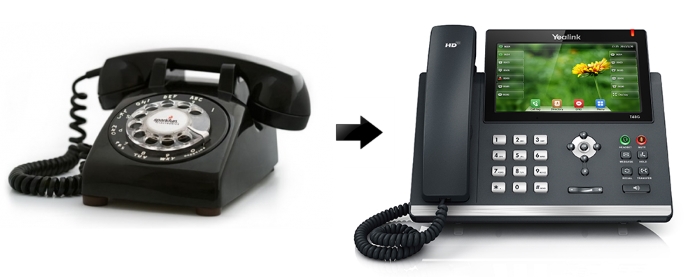
9 – Bolt-ons For When You Need Them
Depending on your business and how you run it you might want a few extra features such as call recording, call queueing, auto attendants, an operators console and maybe even a wall board for a call centre. You may need some of these only some of the time so again, you only need to pay for what you are using when you are using it.
10 – A Low Carbon Footprint
Last and not least, like many Cloud services you and your company will be doing your bit for the environment. The servers used with Hosted Telephony are usually high quality enterprise servers that use less energy than others and result in a reduced carbon footprint all round.
You will probably be using phones which will use some power but you won’t have a phone system control unit to run so will be using less electricity than you would if you had a more traditional system.
Each user takes around 90kbps internet bandwidth per call running over your existing network and possibly your existing broadband supply. Even if you need a dedicated broadband supply this utilises less infrastructure than multiple analogue or ISDN phone lines and therefore uses less energy.
So What’s Not To Like?
Well, there isn’t much not to like but there may be situations where having your own system might be better. With most Hosted Telephony business models you pay by subscription so if you have 50 users then that might cost £400 or so a month once you take the cost of broadband into account. On the other hand a traditional phone system with maintenance, phone line rental and depreciation might cost the same, perhaps more, perhaps less. It depends on convenience and how phone active your staff are.
If you have other systems that integrate with your phone system that perhaps Hosted Telephony cannot integrate with then you may need an appropriate phone system in-house. Maybe you just like to have control of your phone system and run your own in-house Hosted Telephony tailored more specifically to your business.
For many businesses Hosted Telephony is an excellent solution which overall may work out costing less when all the factors of running your own system are taken account.
Trying Out Hosted Telephony
Depending on your supplier you can try Hosted Telephony out. At the very least you can start with 1 or 2 phones to see how it all works. Some suppliers might lend you a trial phone and a subscription for a couple of weeks if they think you have a serious intent. A demonstration is easily possible.
If you would like to know more or just have a chat then fill out our contact form (contact page).


